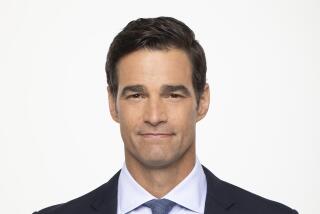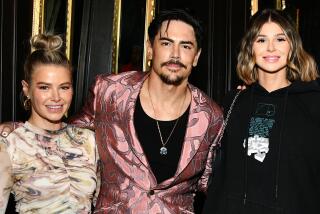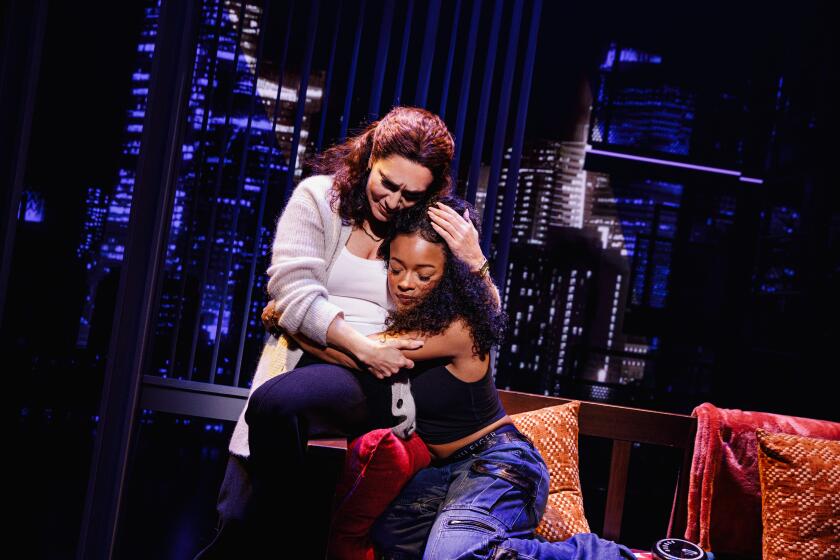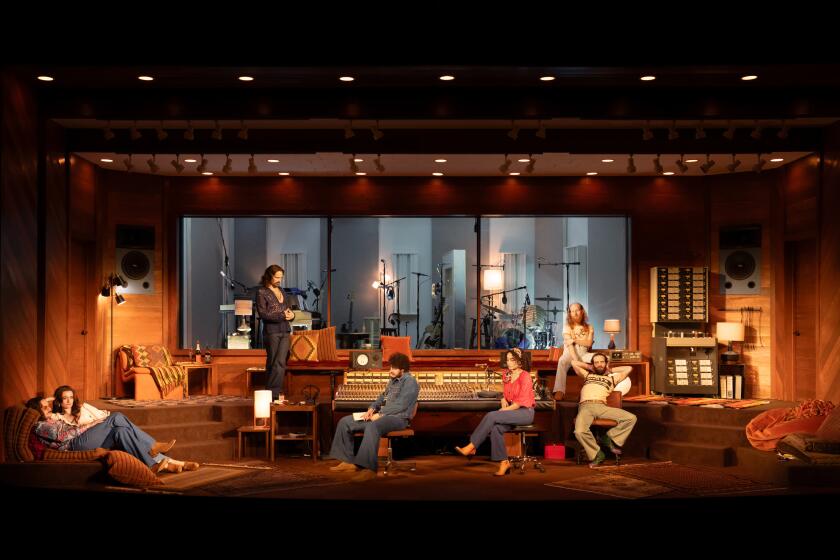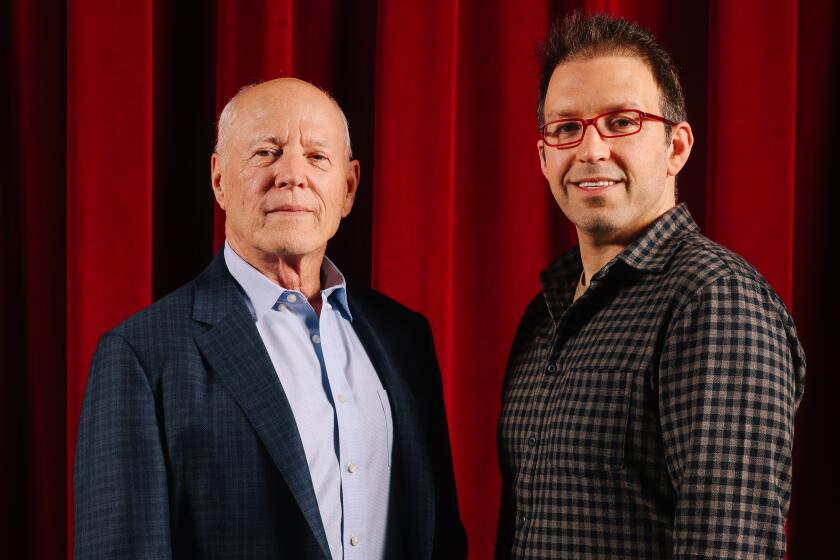Denzel’s Acting School : Washington’s Success Is Built on Technique and Strategy
Denzel Washington is talking about what he says he doesn’t like to talk about: his job. Or rather, the acting craft that has, with the help of leonine good looks and some plum roles, landed the 40-year-old a best supporting actor Oscar (“Glory”) and positioned him in the first rank of an industry where bankable African American leading men can still be counted on one hand.
Slumped in a hotel armchair, black T-shirt stretched over his taut frame, Washington is dissecting a scene from “Crimson Tide,” the “Caine Mutiny”-meets-”Hunt for Red October” thriller that opened Friday.
Washington plays a buttoned-down executive officer on a Trident submarine who mutinies when the ship’s Queeg-like captain, played by Gene Hackman, refuses to call off a missile attack, despite a garbled communique that may countermand the mission. The role requires Washington to go from stoic subservience to self-assured commander in a single scene.
As Washington recounts the volleys between his character and Hackman’s, his slumping body gathers into sharp angles. By the time he has reached the part of the scene where he relieves Hackman of his command, he is sitting up straight in his chair, muscular arms and shoulders poised.
“Even what I did just now,” Washington says, acknowledging his coiled bicep and noticeably pumped-up presence, “you start growing, literally.”
It’s a telling demonstration, both of Washington’s acting abilities and his frank awareness of how he can manipulate them. The combination has made for some indelible moments in his better films: recoiling in disgust when, as the homophobic attorney in “Philadelphia,” a young man makes a pass at him; spouting exquisitely controlled fury from the lectern as Malcolm in “Malcolm X,” and, perhaps most famously, shedding a single defiant tear in “Glory’s” whipping scene.
Washington has a stage actor’s sense of the moment, honed first at San Francisco’s prestigious American Conservatory Theater, where he studied after attending Fordham University, and then in productions for Joseph Papp’s New York Shakespeare Festival and numerous Off Broadway roles, including Malcolm X in “When the Chickens Come Home to Roost” and Pvt. Peterson in Charles Fuller’s Pulitzer Prize-winning drama, “A Soldier’s Play.” The latter garnered Washington an Obie (he subsequently starred in Norman Jewison’s film version, “A Soldier’s Story”) and helped him land the role of Dr. Phillip Chandler on “St. Elsewhere,” the long-running television series.
“I don’t think we take the craft of acting as seriously as we should in this country,” Washington says. “What I find interesting is that almost every time I was nominated for an Academy Award, I was up against people who were either 20 years older than me or were British. All the actors I consider to be greats--Gene Hackman, Dustin Hoffman, Al Pacino, Anthony Hopkins, De Niro, Meryl Streep--they’re all theater. And the younger ones I consider great--Ralph Fiennes and Daniel Day-Lewis and Kenneth Branagh--are all British and they’re all theater.
“An actor learns to act onstage,” he declares. Actors can’t learn to act in movies, he adds, because making a film offers limitless second chances to get things right. Not so with theater.
Still, Washington isn’t exactly rushing back to the stage between films these days. “I can’t do that anymore,” he admits. “I get bored. It becomes quite mechanical.”
Even so, he defends the stage as a crucible for talent. And among African American actors with distinguished theatrical backgrounds, Washington is virtually alone in making the transition to the big-grossing, mainstream dramas, such as “Philadelphia” and “The Pelican Brief,” that play equally well with urban audiences and the mostly white suburban-triplex crowd.
“I don’t know if it was because of ‘Philadelphia’ or ‘The Pelican Brief’ or because of both,” Washington says, “but I can see the difference in my career as a result of those two films. There’s a lot of people who would never go see ‘Malcolm X’ or ‘Cry Freedom’ or ‘Soldier’s Story,’ but they’ll go see Julia Roberts and Tom Hanks. And they see me and say, ‘Well, he’s good, too.’ And then all of a sudden you’re there.”
Washington cites the example of Tom Cruise, whose box-office appeal and serious-actor stock were burnished considerably after appearing with Dustin Hoffman in “Rain Man” and Paul Newman in “The Color of Money.”
“Those were smart moves,” Washington says. “Put yourself up there with some really top guys, so you don’t have to pull the boat by yourself. That’s what I’ve done with [“Crimson Tide”] and, in a sense, on the other films. Actually, it was more of a gamble with [“Philadelphia”] because Tom hadn’t done that type of film. He has broad-based appeal, but could he pull off this role?
“With Julia in ‘Pelican Brief,’ you had a big hit book and an actress that hadn’t done a movie in two years and everybody was waiting. But that was a little scary because, if it had failed, would they say it failed because of me? So when it didn’t--and I’m not knocking other people--but when ‘I Love Trouble’ [starring Roberts and Nick Nolte] didn’t do well, I went: ‘Hey. All right, then, all you nonbelievers.’ ”
What part, then, does Washington’s next movie, “Virtuosity,” a virtual-reality action picture directed by Brett Leonard (“The Lawnmower Man”), play in his career strategy?
On the heels of “Philadelphia” and “Crimson Tide,” the movie would seem to represent exactly the sort of high-concept froth that the actor has mostly avoided.
With a straight face, Washington insists his decision to make the film “had more to do with my son wanting me to do an action movie. I’m serious. And I hadn’t done one in a while.”
Nevertheless, he adds: “I said after I did the first one, ‘Ricochet,’ that I’d never do one again. And now that I’ve done it again, I’ll say it again.” He laughs. “I don’t like them. You gotta run and jump and you don’t talk. It’s not acting.”
For now, the intensely private Washington is coming to grips with “the whole movie-star thing. It has its benefits and its baggage. I’m sort of in denial about that. I like to think of myself more as the regular Joe, just chopping wood. I didn’t get into this to be a movie star.”
So Denzel Washington, semi-reluctant movie star, carries on. As soon as “Virtuosity” wraps, Washington and wife Pauletta Pearson and their four children will decamp from their home in Toluca Lake and head for a summer’s travels in Africa and Spain.
“I’m not going to work for a while, definitely not before fall,” Washington says, adding only that his next projects are still in the “chatting” stage, although he is set to star opposite Whitney Houston in “The Bishop’s Wife” and will rejoin “Glory” director Ed Zwick to make “Courage Under Fire,” as a military investigator probing the battlefield death of a female Gulf War soldier. A remake of “A Star Is Born,” also with Houston, is a possibility, and Spike Lee has been lobbying the actor to play the lead in a movie about Jackie Robinson. This fall, the long-completed “Devil in a Blue Dress,” starring Washington and Jennifer Beals, is scheduled to be released.
If it’s gratifying to be in such demand, Washington certainly doesn’t show it.
“I don’t even want to think about them,” he says wearily. “I’m gonna have to. But I don’t want to.”
More to Read
The biggest entertainment stories
Get our big stories about Hollywood, film, television, music, arts, culture and more right in your inbox as soon as they publish.
You may occasionally receive promotional content from the Los Angeles Times.
